

Workism Is Making Americans Miserable (2019) It’s really an unfortunate catch-22.
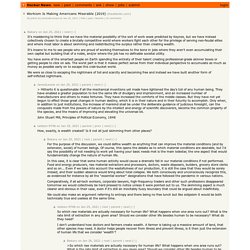
Women being barred from the workplace (by law or stigma) meant we lost half of society’s talent and those women who wanted to work couldn’t. Once the most eager to work start working, the other families see the incredible benefits of a two income household in a single income household world. It’s almost a no brainer to start working too, as you’re nearly doubling your family income. Enough iterations of that, and now we live in a two income household world, where the “family expenses” of childcare, homes, college education, and so on are priced for two income homes, and everyone else (single people, the young, students), are stuck in unaffordability and also getting married at later ages.
Then, women didn’t have to work but couldn’t work anyways. Evolution at its finest : ABoringDystopia. Meetings as a developer : ProgrammerHumor. Albuquerque Gives Panhandlers Day Jobs, Not Tickets. Twice a week, a city van rolls through downtown Albuquerque, N.M., stopping at popular panhandling locations.
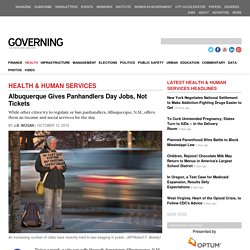
The driver, Will Cole, asks panhandlers if they want a day job. Work pays $9 an hour, higher than the state's $7.50 minimum wage. The city's public works department can employ up to 10 people a day for beautification projects, such as pulling weeds and picking up litter. The van has been in circulation since September, and while "we get a couple no's here and there," said Cole, he's usually finds 10 people willing to trade panhandling for a day job. The van initiative is part of a larger effort in Albuquerque to reduce homelessness and panhandling. Branded "There's a Better Way," the point of the campaign is to encourage more effective charitable giving to help the homeless. Albuquerque, with a population of about 550,000, reported about 1,200 homeless people last year through its annual point-in-time count. For Cole, the proof of impact is in the small details.
“What’s your current salary?” is a trap question—Here's how to answer it. You’ve been job hunting for a while, and you finally hear back about a job you really want.
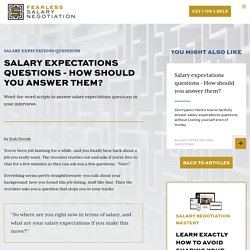
The recruiter reaches out and asks if you’re free to chat for a few minutes so they can ask you a few questions. “Sure!” Everything seems pretty straightforward—you talk about your background, how you found this job listing, stuff like that. Then the recruiter asks you a question that stops you in your tracks: “So where are you right now in terms of salary, and what are you looking for if you make this move?” Wait a minute. You intuitively know that sharing your current salary or desired salary probably isn’t in your best interest. What if they insist? What if they tell you the interview process simply can’t continue unless you share your current salary or expected salary?
This will usually come up in the “pre-interview” or “pre-screen”, which is right at the beginning of the interview process. Article contents. This Republican mayor has an incredibly simple idea to help the homeless. And it seems to be working. Work program gives homeless dignity, hope Albuquerque is celebrating the one year anniversary of the city’s successful "There’s a Better Way” program, which hires panhandlers to work in maintenance jobs and also aims to connect them with services.
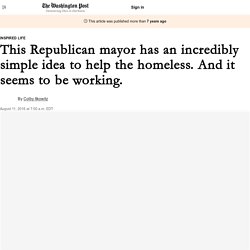
Albuquerque is celebrating the one year anniversary of the city’s successful "There’s a Better Way” program. (Albuquerque Mayor's Office) ‘It Makes You Human Again’ ALBUQUERQUE—Under a cloudless desert sky, David Kelhoyoma, a Marine veteran who help liberate Kuwait City during the first Gulf War, roamed the top of a city landfill, stuffing stray bits of plastic into a garbage bag.
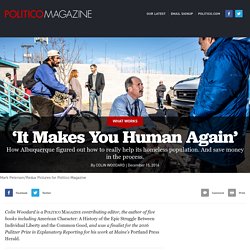
He felt really good about where he was. An hour earlier he had been panhandling on a corner in downtown Albuquerque, something he’s done off and on during years of intermittent homelessness, when a van came by asking if he’d like a job for the day. Now he and eight other homeless people are walking along an artificial hillside at the city’s 980-acre Cerro Colorado landfill, picking up bits of trash that somehow avoided being bulldozed under the dirt. In fluorescent orange vests they fill garbage bags with bits of plastic sheeting, broken toys and a surprising number of discarded hospital breathing tubes, anything that might be carried off by the wind. It’s part of an innovative city program for helping the homeless that has attracted national attention.
Richard J. St. Log In. No candidate talked much about automation on the campaign trail.

Technology is not as convenient a villain as China or Mexico, there is no clear way to stop it, and many of the technology companies are in the United States and benefit the country in many ways. Mr. Trump told a group of tech company leaders last Wednesday: “We want you to keep going with the incredible innovation. Anything we can do to help this go along, we’re going to be there for you.” Andrew F. Photo Globalization is clearly responsible for some of the job losses, particularly trade with China during the 2000s, which led to the rapid loss of 2 million to 2.4 million net jobs, according to research by economists including Daron Acemoglu and David Autor of M.I.T.
People who work in parts of the country most affected by imports generally have greater unemployment and reduced income for the rest of their lives, Mr. “What that ultimately means is there will be fewer jobs,” he said on CNBC. Take the steel industry.